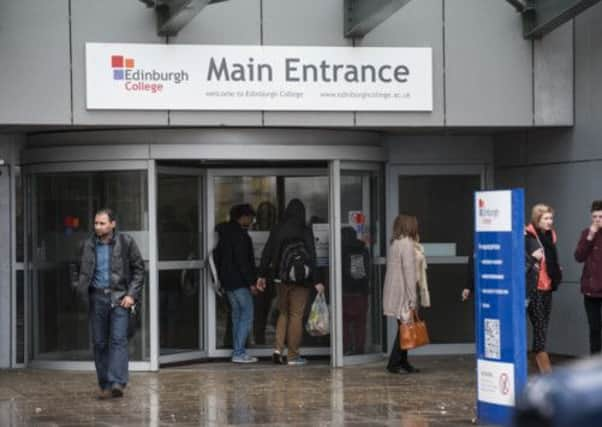Scottish student roll for part-time classes halves


Figures compiled by the umbrella organisation Colleges Scotland show there were around 29,000 people studying evening and weekend courses last year, compared with 53,000 in 2008.
The fall follows attempts by the Scottish Government to radically reshape the college sector to focus on getting 16 to 19-year-olds into work, instead of classes dubbed “hobby courses” by critics.
Advertisement
Hide AdAdvertisement
Hide AdBut it also reflects the fact that fewer people are prepared to pay the fees associated with evening classes, which have traditionally been paid for by the student or their employer.
The figures show that while courses in cookery, dance and sport are among those in decline, so too are those in IT, languages, teacher training, childcare and construction.
Around 10 per cent of those studying at college do so during the evenings or weekends, with well over half of those having no previous qualifications.
Analysis of the figures, which were collated by Colleges Scotland using data from the Scottish Funding Council, show that of the approximately 29,000 students on evening classes in 2012, the biggest group (13,118) was made up of women aged 25 to 59. There were 6,179 men from the same age group.
While classes in subjects such as cookery and photography remain popular, thousands of students are enrolled in courses ranging from childcare to construction.
According to the figures, nearly 4,000 students were enrolled in language courses, including English. A significant proportion of these were studying for Highers.
There were more than 2,000 students in catering, tourism and leisure courses, while engineering, IT and business classes all had a similar number.
John Henderson, chief executive of Colleges Scotland, said: “There’s a misconception that evening classes are simply hobby classes.
Advertisement
Hide AdAdvertisement
Hide Ad“As the Scottish Funding Council’s data shows, Scottish colleges offer evening classes across all subject areas.
“Evening classes are used by learners to gain qualifications such as Highers, gain extra skills to help them in their job, learn languages and get back into learning.
“These classes give people in communities across Scotland the opportunity to build their skills and improve their employability, as well as improve social inclusion. They are a crucial element of colleges’ offering to learners.”
Scotland’s colleges are currently undergoing a major overhaul after the Scottish Government began reforming the further education sector to focus on getting school leavers into employment.
While universities have seen the money they receive from government increase, the further education sector will see its budget cut by £24.7 million next year alone, putting pressure on colleges to cut staff and the courses they offer.
Larry Flanagan, general secretary of the Educational Institute of Scotland (EIS), the country’s largest teaching union, said he “fundamentally disagreed” with the direction taken by the government.
“Part of our argument is that further education provides a major second chance for people,” he said. “Of course 16 to 19-year-olds are important, but for a lot of adults who have left school early and gone into the world of work, they find themselves going back to college in their early 20s.
“Often that kind of part-time study is a way back into more study. A lot of these people won’t have had great academic results at school, and these short courses are a stepping stone back into education.
Advertisement
Hide AdAdvertisement
Hide Ad“The Scottish Government has clearly focused on addressing youth unemployment. Nobody is going to argue about the guarantees given to 16 to 19-year-olds, but it is being done at the expense of other learners.”
A Scottish Government spokeswoman said: “We have asked colleges to prioritise full-time courses for young people, where the need is greatest, to maximise their chances of getting a job and staying in a job.
“We are delivering an extra £61m to colleges over two years. Extra investment from the Scottish Government means colleges are delivering more than first planned with a particular focus on 16 to 24-year-olds, while funds have also been identified specifically for women and older learners.”
Figures released earlier this year showed the overall number of students in Scotland’s colleges has fallen by more than 120,000 since the SNP came to power in 2007.
The statistics showed that while the number of full-time learners had increased by 19 per cent, there had been an overall reduction in student numbers by 121,320 due to cuts in part-time provision. The figures also showed the number of full-time 16 and 17-year-olds fell by 14 per cent.
Twitter: @chris_scotsman